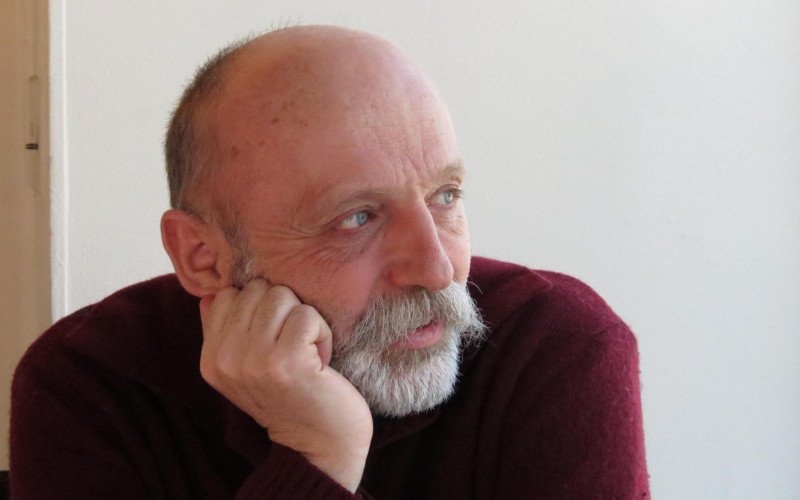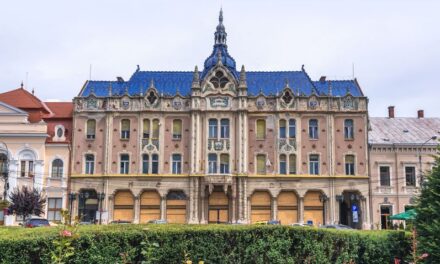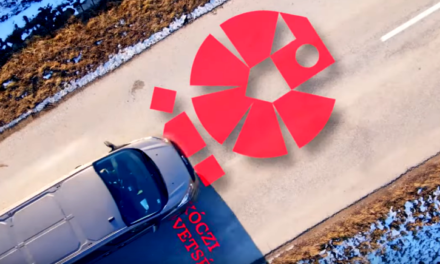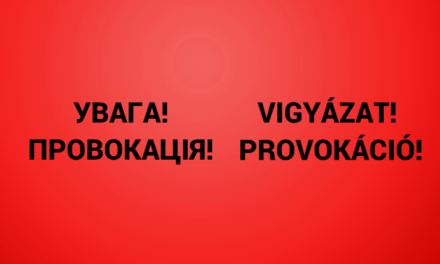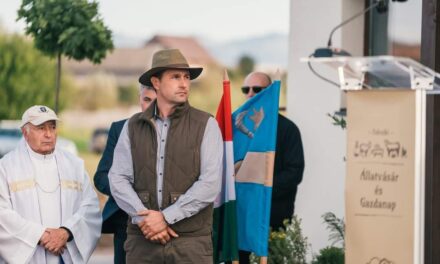He was two years old when his father, a reformed pastor, was sentenced to 22 years in prison, and he was deported to the Gulag in Romania with his mother and six siblings. Staying alive in the camp was not easy due to starvation, disease and frost, but András Visky says: he wrote his book in such a way that he neither wanted to take revenge nor to become a hero. The "Evicting " was recently published by Jelenkor Kiadó.
He carried his story for a long time: in 1958, when he was two years old, he was sent to a camp around the Danube Delta, and - although he had already memorialized his mother in his play Júlia - it was only now, in 2022, that a novel was born. How has the book been shaped over the past decades?
I wanted to write a happy story, and now I'm curious to see if it comes through. Home - like the happiness of freedom - cannot be taken away even during a dark dictatorship, because you can take it with you in your soul.
I can tell you it will come through.
I don't want to be overbearing either, the safety of the home is impossible in the camp conditions, it's impossible, sometimes downright terrible things happened to us, and if I look at it from my mother's side, her sufferings and desperate efforts to keep her seven children alive are completely incomprehensible. His suffering seems to have remained in his bones or lungs, hiding it from us. He gave us so much love and protected us as long as he could. This novel had to be born, and it took many years to find its shape.
This mosaic, numbered paragraph format?
The book actually has the form of a Bible, the biblical passages are also numbered. The Holy Scriptures are not a continuous story either, but they are put together in such a way that we can read them as a continuous story from the story of creation to the book of the last judgment, i.e. to the event of the coming of the Messiah that fulfills the redemption.
Even in the camp, a Bible that happened to be left with you meant daily reading and something to hold on to.
I wanted to expose myself to how it is possible to tell a fragmented story - as the past flashes in a child's memory as a series of images - as a continuous narrative. From the time an angel arrives at the family who follows us throughout our lives, until the narrator is faced with the demonic temptation of losing his freedom, the experience of military service.
The angel Nényu, who joined the family as a maid and undertook the resettlement with them, and the military appears at the end of the novel. Why does the novel end with this?
It was there that I understood that man's most terrible invention is the ability to turn himself into a killing machine. And since I came to consciousness in a lager, I was struck by the structural identity of the two.
The executed prisoner
They did not lose their human dignity in the camp. What was the secret of this?
Being persecuted for your beliefs and convictions can strengthen a person very much. This was also my father's secret, I think: to remain a free person in the dark periods of deprivation of liberty. That is, to be on the good side. And it is a special gift for me that I was already ostracized and marked as a child, and later on I did not have to make unacceptable decisions for the sake of my so-called career.
Before the regime change, I could not even have a career, I know from my secret service documents that the Securitate made the decision that I could not work in culture. Because during the communist dictatorship, working in culture was a privilege, you didn't have to spend eight hours at work, for example, and you could even get real coffee and hot dogs in the editorial buffets, so that cultural workers felt even more that they had something to lose if they didn't bargain daily and everything with their sentence.
I worked in a factory, in a mine, there were times when I was only allowed to work at night. It was also an important experience that I lived in constant deprivation of freedom, which gave me a constant task to think about the true nature of freedom.
Practically since the age of two...
Growing up, I had no real temptations. They tried me once when I was a first-year university student at the engineering faculty, also because I was too good a student, perhaps out of inattention. After the first and then the second exam period, I was offered to join the party. I had classmates who did it for their careers and they advised me to do the same. How could I betray my father, I asked them. And anyway, why should a career be forced in a dictatorship?
Spectacular professional careers also had ideological goods, it was impossible for you to remain free. Those who entered, who are otherwise great friends and excellent intellects, certainly had a hard time accounting for their party books after '89. They also said that I was right, but I brushed it off: it's not about my truth, it was given to me as a gift. There is truth, and it goes hand in hand with freedom. And it's not my property, it's the other way around, he owns me.
In the camp, when you could already feel that sooner or later they would let us go, they tried to found a communist party cell, which of course was very funny for most camp residents. But they also founded an association of prisoners who sympathized with communism in the prisons, and they created the impression that those who enter will be released sooner. In Jilava, perhaps the most terrible prison in Romania, the prisoner who founded the association to inspire the authorities was eventually executed.
Then you embraced this truth as a child, even though what you experienced could have pushed you in a different direction.
Maybe something similar didn't happen to us because our parents didn't hide anything from us. When my father got out of prison after six years, he told us at one of the table discussions that if we were lucky, we would go to prison too. It was a very sharp statement, but he did not want to scare us, but to comfort us. And to strengthen against all temptations of betrayal.
Several times I have witnessed the internal affairs officers come out and search the house. The house search was an amazing experience, as it was a well-structured choreography of aggression. They knew in advance that they wouldn't find anything, but that wasn't the goal. When they wanted to find evidence against the state, they always found it anyway. They ransacked the closets, scattered the underwear, took our books, my father's notes, and took my father with them every time.
My parents taught me to strive to live a real life, and these drags were the daily reality of our lives. It wouldn't have been credible in any way if you had created a hero story, because then I would have become part of the prevailing public discourse after '89, that is, everyone, without exception, became a hero of the past era overnight.
It took a long time for me to find the form of the novel so that the writing would be a real justice and not show that we were in the wrong place at the wrong time, but on the contrary, we were in the right place at the right time. The prison and the lager strengthened our identity, and we haven't been sold since.
God's job description
He comforted his mother in the camp by saying that he would write this, which meant that he would "revenge" her in some way. In this respect, he fulfilled his promise. Does he write at the beginning that the book is fiction because, say, all his brothers would write it differently?
A novel can only be born if a person gets to know and reconstruct reality for himself. All the names I describe - and this was a great struggle for me - are real, including the names and ranks of the internal affairs officers. So this is a reconstruction of reality, and I hope the reader will perceive it as reality, because the novelist perceived this reality with all his senses during the writing of the book.
My identity was built from this, from the sounds of the lager, the smells of the barracks, and the many languages of the prisoners living there. If I write down a street name in Bucharest, for example, it can be found. While writing, I always had Google Street View in front of me, I zoomed in on the locations, in many cases I visited different places, and it even helped if I couldn't find anything. But the novel is fiction, I didn't write a memoir, but a multi-chapter novel. Fiction is much stronger than reality, because it evokes dreamlike, sometimes magical events that have become a fact of life in the language of literature.
The person of God is such a fact of life for me, he was and remains like a family member who is sometimes just as helpless and weak as we are, and he admits it. I don't like arguing about the existence of God, neither do I, but he has to prove his existence, and he does from time to time. The proof of God's existence is in God's job description, not mine.
His parents didn't want to, but they couldn't protect their children from certain experiences. His fatally weakened mother - after her children take her out of the morgue - says in the camp: "I always wanted to be stronger than you, but I gave up, finally, my heart let go of the grip, I can't protect you from anything and anyone".
He was able to say this very well later, that his heart attack and clinical death were related to the fact that he wanted to keep his children, but he had to come to the point that he could not keep us alive even with the greatest efforts, the sparrows had to be released . Rather, you should believe that the life and even the death of sparrows are counted, and that we can all become part of the great story.
In this Gospel passage, the word sparrow is a diminutive, and this is a particularly fine choice. Hamlet also refers to this passage when he senses his death before the duel. He is not telling Horatio that we must survive at all costs, but that we must strive to fulfill our lives. Our mother, according to her own words, had to realize exactly this: it is not necessary to survive, but to live through and fulfill who we are. And it's not a matter of years.
Wolves in minus 30 degrees
And the children sometimes miraculously survived.
My brother Péter came back from the dead twice: he had to be let go, but then he still came back to us. First, his life was in danger due to polio, and then he fell into the icy Danube. In front of me is how he slides into it and is carried away by the water. As a polio sufferer, he had no human chance of being saved. My brothers had to go to camp school, for a while to our own camp, but then they had to go to another settlement, Borduşani, on foot in winter and summer.
If the north-east Russian wind starts in that region, the houses will also be covered in snow. This is not fiction, the whole camp was covered in snow many times, people dug each other out, we were also dug out several times. He stormed the barracks in such a way that it was dark even during the day, we couldn't see out. In the winter, my brothers were walking in minus 30-40 degrees, listening to the howling of wolves. Sometimes they came from the nearby floodplain forests to the camps and tore horses apart, I remember these pictures. Our mother had to let her children go, she couldn't hold their hands.
He had to face the question daily whether the passage about the sparrows in the Gospel was a beautiful, too beautiful poetic picture, or whether it was really a revelation of Providence. My mother asked God for his reality every day. He was both cold and hot, but God is not offensive at all. The church is very much so, I have no idea where it gets it from.
Ferenc's brother explodes in the hand of the carbide - with which they worked in one of the factories - and practically goes blind.
In front of my mother's eyes.
You almost had to cut off your toes because you froze.
The winter was terrible in the thin-walled barracks. All summer long, we collected driftwood and corn stalks so that the water could boil on the tin stove with great difficulty. We were constantly hungry, I can recall that even now. The winters were indeed very difficult, sometimes they gifted us children with sparkling happiness. In the summer it was easier, we even found sweet potatoes, we picked alfalfa, we made a vegetable out of it, we also collected the fragrant pods of the carob tree and squeezed the delicious honey from them. My knowledge of reform kitchens is quite diverse...
Was the goal to destroy you?
The aim was to cleanse society of the actors of the pre-war political system. That is why extermination camps and prisons were often re-educational institutions. Members of the former political elite, academics, well-educated intellectuals, resisters of all ranks and ranks were put in common cells and forced labor camps. My father learned German and French in prison.
They held seminars and lectures for each other, as they had to survive somehow. In such cases, of course, they were beaten to pieces, they had to be forced down on the stone, and they were beaten with rubber sticks while crawling over them. But the prison academy still went on. Church services were held, Bible classes were held, and my father's excellent knowledge of Greek and Hebrew proved to be very useful even in prison.
In the camp, being an Austro-Hungarian family, you also had to deal with the language difficulties, for example your siblings were humiliated at school because of this.
It was very difficult for our mother, because she could not teach her own children Romanian, since she was born in Budapest and grew up here. On the book cover is a picture of my two school-aged sisters and Aurél, who helped us a lot. During the 1956 student protests in Temesvár, Aurél wrote the document in which the students' demands were formulated. Of course, he was put in prison, but he was not allowed to go home afterwards - this was a common practice - he ended up in the camp. He taught us Romanian. Uncle Nicu, a Romanian philologist and young university assistant professor, also dealt with us a lot. At school, however, my brothers were really humiliated a lot.
The teacher called on the class to make fun of her and throw paper cookies at her sister because she couldn't say something correctly.
Of course, we were savages, barbaric migrant descendants, but not for intellectual people.
The full interview can be read on the Index!
Featured image source: Litera

